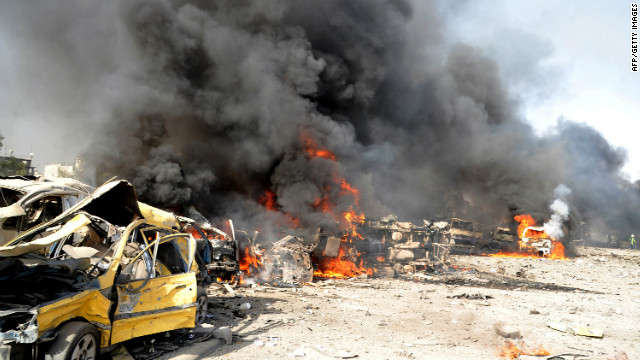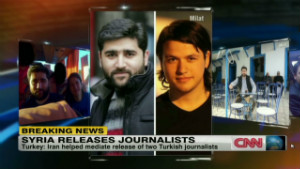
- Turkey plans to pick up Adem Ozkose and Hamit Coskun from Tehran
- An opposition group reports at least three deaths on Saturday
- At least 20 people were killed across Syria on Friday, opposition activists say
Are you there? Send us your images or video.
(CNN) -- Two Turkish journalists who had been imprisoned in Damascus were headed to Tehran on Saturday after Iranian mediation with the Syrian government secured their release, a Turkish foreign ministry spokesman said.
Reporter Adem Ozkose and freelance cameraman Hamit Coskun were last heard from on March 9 as they were traveling through Syria's troubled Idlib province, Ozkose's father, Mustafa, said last week.
"They were apprehended by Syrian authorities while they were performing their journalistic duties, and that's why they were brought down to Damascus," said Selcuk Unal, the Turkish foreign ministry spokesman. Unal said Turkey is planning to send a plane to Tehran to pick up Ozkose and Coskun.
News of the journalists' release came amid reports of more bloodshed in Syria.
 Syria releases journalists
Syria releases journalists The Local Coordination Committees of Syria, an opposition network, reported at least three deaths on Saturday. The deaths include one person who was killed by regime sniper fire in Hama and one man who died from gunshot wounds sustained Friday after regime forces stormed his Deir Ezzor home, the group said.
Late Friday, a powerful explosion rocked Syria's most populous city of Aleppo, killing a guard at an office of President Bashar al-Assad's ruling Baath Party, opposition groups reported.
The cause of the blast was not immediately known. Heavy gunfire was heard in its aftermath, the UK-based Syrian Observatory for Human Rights reported.
At least 20 people, including the Aleppo security guard, were killed across Syria on Friday, the observatory said.
Damascus and Aleppo have been the scene of a flurry of attacks in recent months. Aleppo, a commercial center and long a bastion of support for al-Assad, had been largely spared in Syria's 14 months of bloody uprising. But recent protests and violence there could signal a significant shift.
CNN's Ivan Watson, Saad Abedine, Yesim Comert and Joe Sterling contributed to this report.



